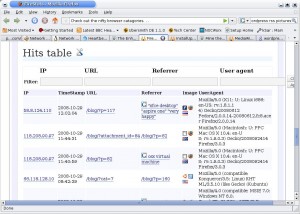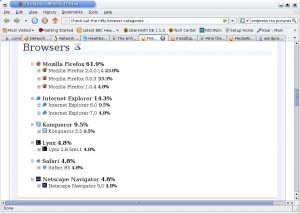SEO, Digg & Blog Traffic
by admin on Nov.16, 2008, under Linux
A couple weeks back I posted about Firestats. I really have been amazed by this little gem. I love seeing all the countries people come from, what blog and wiki articles they read, what the most popular pages are, etc. It is like geek candy.
I was surprised at the amount of traffic I am getting and the Google rankings some of my wiki pages have – they are surprisingly good.
So, I decided to add some additional features to my blog and wiki.
You will now see an AddThis widget at the end of each post. This has a menu popup allowing you to perform a number of social bookmarking functions – you can Digg a post, or add it to a number of social sites.
I have also made it so any blog post that gets Dugg will have a Digg Badge show at the top of the post.
If you want to do the same, I wrote a wiki article that might help you. I am hoping to see some of these pretty soon:
I am still working out the kinks on using the AddThis widget in MediaWiki, I have the plugin showing up correctly, but can’t seem to get a pop up style button to work, and need to see if the one I have is really working, etc. I would love to get this working fully on my wiki. I don’t see wiki articles Dugg very much, and think this could be pretty cool.
If you read a post or article you like, I would love it if you would use the widget at the end to link it to your favoriate social bookmarking site, Digg or otherwise. And comments are of course always welcome. I see lots of pople reading articles but not many comments, so I would like to do more to encourage this.
Thanks, and as I learn more I will share what I discover here on on my wiki.
Jericho, Florida
by admin on Nov.12, 2008, under IT Adventures
I’ve often wondered what a complete collapse of the core infrastructure of the country would be like – ala Jericho (the ABC TV show) style. Today was a great example . . .
4:43 In Line
The high school student moves to scan my very last of 10 items when it happens. The EMP hits. All the registers go down simultaneously. All systems are off line. The UPSes begin chirping. I wait for the systems to reboot. It’s not looking good. People are starting to look pretty confused. New people walk in and are stunned – they start to mill back and forth.
4:47 Take Action
Time to militarize this operation. “Can you do a manual ticket?” I inquire of the young lady. “I would have to get okay from my manager . . . ” She replies. “Great, let me just borrow that pen and I’ll be right back.” I take a paper bag and head off to get my prices. The lines are quite long now. The store managers direct cookies be passed out to calm the masses. The teenager behind me on her cell phone does not appear to notice anything is out of the ordinary yet. I wonder if the phone actually works.
4:49 Operation Dinner Liberation
Mapping the most efficient route I quickly obtain the prices for my select staples and return. (The lights go on and off a few times – perhaps switching backup power sources) I ask customer services to write a manual ticket. I ask if the phone lines are up to accept credit cards. Nope. No problem I will be right back.
Firestats Rocks the House
by admin on Oct.29, 2008, under Linux
I’ve been using a stats plugin for Worpress and it has done a good enough job, but I recently found myself looking for a stats reporting plugin for my Wiki as well. I have added a lot of articles over the last year and was curious to see exactly how many hits it gets.
Googling around quickly led me to Firestats. What a wonderful product. It allows you to centrally managed stats from several applications such as MediaWiki, WordPress, Joomla, Drupal, etc. and manage multiple instances of these very easily. See their page on multiple sites for more information. Additionally you can use this on any generic PHP page, which is a great feature.
The stand alone installer worked extremely well. After Firestats is installed you can follow the directions on how to add a database and then use the plugins for a variety of applications. Follow the instructions for these plugins very carefully and before you know it you will have stats pages for all your separate sites you wish to monitor.
The Firestats interface is quite nice, with graphical representations for visitors browser types, OSes, country flags for their origin IP, etc. The interface is quite nice.
Here are a few screen shots, but it really is far more impressive that these show. This one shows the hits page, with icons for the visitors browers, OS and country along with the Goolge or other referring link. Very geeky undoubtedly.
This one shows the categories of browsers and versions. There are also categories for OS versions and countries too:
If you are looking for stats software for you site, I would highly recommend this. It seems quite versitle. I am going to look into and see if there are extended graphing and reporting capabilities, but all the data is just stored in a MySQL database, so you can easily do with it as you will.
Sago Labs – Welcome!
by admin on Oct.28, 2008, under Sago Labs
My company, Sago Networks, is launching a new section to our website – Sago Labs. I’ll be contributing to this via my blog and posting interesting bits on what behind the scenes projects I am involved with to let others know some of the interesting things we have cooking in the kitchen and sharing this with the community.
Here you will find information on ongoing research projects and results, new technologies we are exploring, and general Geekness in the Superlative. Also, you may get a comment or two on Sago culture, people and events – as it is a rather colorful place to work and there is always something interesting or funny afoot.
Watch the RSS feed for more to come!
Cheers,
Pete Eby
MySQL Server and Intel Compiler
by admin on Oct.23, 2008, under Linux, Sago Labs
Hot on the heels of the last post on the Intel C Compiler for Linux, a colleague pointed out this MySQL developer post which talks about compiling MYSQL with different options and compilers to obtain performance improvements.
I Googled around, thinking that perhaps there may be some information from people who have specifically tried to compile the MySQL daemon with the Intel Compiler (ICC). Indeed I found quite a bit. Here is an extremely interesting presentation giving MySQLd benchmarks from compiling with ICC. Although this is based on earlier versions of ICC and MySQL, it is quite likely similar performance benefits could be seen with current versions.
Further looking about I discovered that MySQL binaries compiled using ICC for a variety of platforms are available for download directly from the MySQL Developer site. Just look in the downloads section and you will see the ICC versions available.
This makes it extremely simple to expiriment with these versions and benchmark them to see if they may be useful in a production environment.



